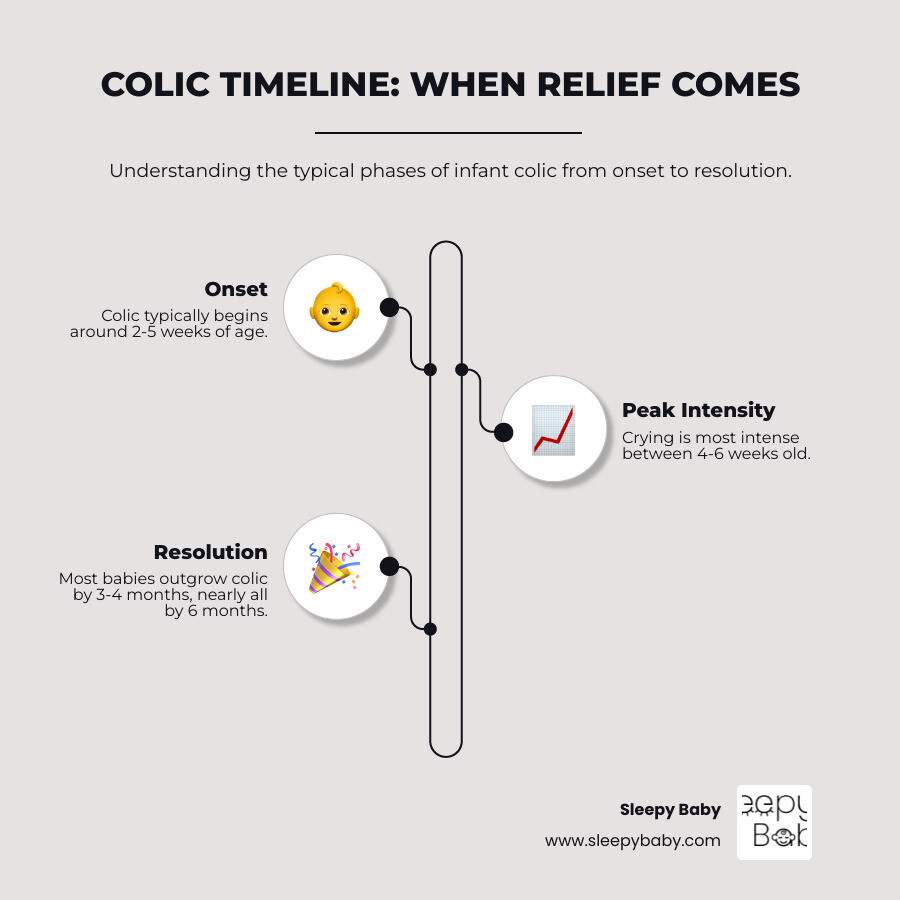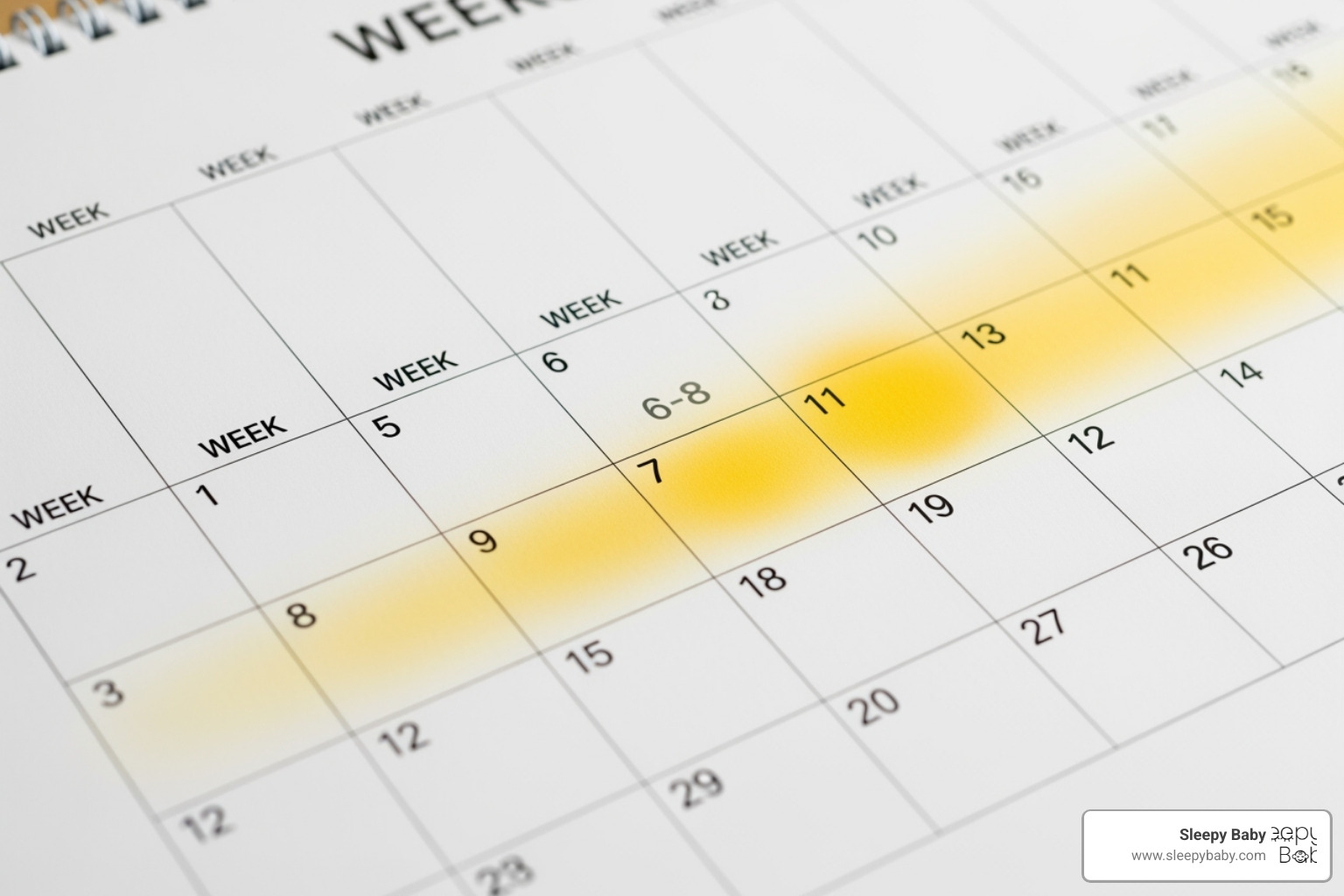
















When does colic pain go away is the desperate question keeping new parents awake. The good news? Most babies outgrow colic by 3-4 months, with symptoms peaking around 6 weeks and improving from there.
Quick Answer:
Colic affects about 1 in 5 babies and is defined by the "rule of threes": crying for more than 3 hours a day, more than 3 days a week, for more than 3 weeks. This isn't your fault. Your baby isn't sick, and you haven't done anything wrong. The crying often happens in the evening, and your baby may clench their fists, arch their back, and seem impossible to comfort.
While the exact cause is unknown, experts believe it stems from an immature nervous system that makes babies sensitive to stimulation. My own experience with my newborn's endless crying led me to understand exactly when does colic pain go away and inspired the creation of tools to help families survive this challenging phase.

Colic is a specific pattern of crying in an otherwise healthy baby. Here are the hallmarks:
If your baby shows signs of illness—like a fever, vomiting, or poor feeding—contact your doctor immediately, as this could indicate something more serious.
Experts aren't entirely sure what causes colic, but several theories exist:
Colic is not a reflection of your parenting. It's a temporary phase that many families steer.

When you're in the thick of it, when does colic pain go away is a vital question. The good news is that colic follows a predictable timeline with three phases: onset, peak, and resolution. Understanding this can make the challenging period feel more manageable.
After a calm first few weeks, colic often makes its debut between 2 to 5 weeks of age.
For premature babies, colic often starts based on their corrected age (due date) rather than their birth date. For example, a baby born 4 weeks early might not show signs of colic until they are 6-9 weeks old chronologically, as their nervous system is still catching up.
The most challenging period is the peak, which typically hits when your baby is 4 to 6 weeks old. Many parents find 6 weeks to be the most difficult.
During this phase, crying spells last longer, are more frequent, and seem impossible to soothe. This is when parental exhaustion is at its highest. The evening hours can be particularly intense. This peak is a normal part of your baby's nervous system development; it doesn't mean you're doing anything wrong.
Here is the news every exhausted parent needs: when does colic pain go away has a clear answer.
Most babies show significant improvement by 3 to 4 months of age as their nervous system matures. The statistics are encouraging: 90% of babies are colic-free by 16 weeks (4 months). For the rest, relief usually comes by 6 months.
For some babies, the change is sudden, while for others, it's a gradual fading of symptoms. Both are normal. This resolution often coincides with developmental milestones like social smiling and longer sleep stretches, as your baby becomes more comfortable in the world.
While waiting for when does colic pain go away naturally, you can use proven strategies to comfort your baby. What works for one baby may not work for another, so be patient and persistent as you try different combinations.
Dr. Harvey Karp's "5 S's" recreate the womb environment to calm a baby's nervous system. These techniques are also taught in programs like The Period of PURPLE Crying program.
Recreating the sounds and movements of the womb can bring remarkable peace.
Small changes to your routine can make a big difference.

Understanding how colic departs and what might influence the timeline can help you prepare for your family's journey.
Every baby is different. For some, colic seems to disappear overnight. More commonly, it fades gradually. You might notice crying spells getting shorter or that your baby is easier to soothe. Both paths are normal and signs that your baby's nervous system is maturing.
While most babies outgrow colic by 3-4 months, a few factors can influence the timeline for when does colic pain go away.
If your baby is still experiencing inconsolable crying spells past the four-month mark, it's time to consult your pediatrician. While some babies just take longer to outgrow this phase, it's important to rule out other causes.
Your doctor can re-evaluate for issues like food allergies or reflux. Keep a diary of crying episodes to help your doctor understand the patterns. For more information, see When to call your doctor for colic.
Trust your parental instincts. If something feels off, seek professional guidance. Even in cases where colic lasts longer, it will eventually resolve.
Let's tackle the most common concerns parents have about when does colic pain go away and what it means for your family.
The key is that colic occurs in an otherwise healthy baby. A colicky baby eats well, gains weight, and is alert and responsive between crying spells.
Call your doctor immediately for red flags like a fever, forceful vomiting, bloody stools, unusual lethargy, a weak cry, or poor feeding. Your pediatrician can rule out other medical conditions. Always trust your instincts.
The reassuring news is that colic causes no long-term problems for your child. It doesn't affect their development, growth, or future temperament. They will meet their milestones on schedule.
Some research on a possible link to childhood migraines exists, but it is not definitive and doesn't mean every colicky baby will develop them. Your baby's future is bright.
Caring for a colicky baby is incredibly stressful. Taking care of yourself is essential.
Remind yourself that this phase is temporary. Every day brings you closer to the end of colic.
Remember this: when does colic pain go away has a hopeful answer. Most babies outgrow colic by 3-4 months, with nearly all finding relief by 6 months. The sleepless nights and feelings of frustration are temporary.
You are a good parent. Your baby's colic is not your fault. It is a developmental phase that some babies go through as their nervous systems mature. The exhaustion you feel is valid, and it's okay to feel overwhelmed. What matters is that you keep showing up and loving your baby through this challenge.
At Sleepy Baby, we understand this struggle because we've been there. That's why we created portable, intelligent sleep aids that mimic a caregiver's comforting touch with rhythmic patting and safe, low-decibel white noise. Our devices offer hands-free support when your arms are tired, giving you and your baby moments of calm in the storm.
Asking for help is smart. You deserve support, whether from family, friends, or innovative soothing aids. Soon, you'll look back on this phase as a distant memory. You will get through this. For more solutions, explore our guide on Gadgets to the Rescue: Top Colic Relief Devices for Babies.
Hang in there. You've got this.